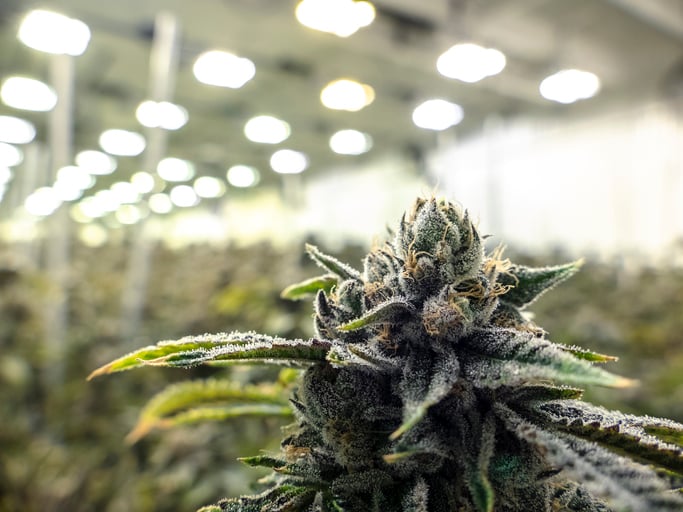Investors who loaded up on Canadian cannabis producers ahead of the legalization of adult-use marijuana have a lot to be disappointed about. Market values for Aphria Inc. (APHA +0.00%), Canopy Growth Corporation (CGC 1.72%), and Tilray, Inc. (TLRY +0.00%) have fallen by a combined $4.5 billion since legalized recreational marijuana sales began on Oct. 17.
The global market for legal cannabis is expected to reach $57 billion by 2027, which has some investors expecting swift recoveries. While recovery isn't outside the realm of possibility, investors should understand what needs to happen before they can mount a comeback.

Image source: Getty Images.
Aphria Inc.: Inauspicious beginning
Shares of Aphria Inc. have already fallen 19% since they began trading on the New York Stock Exchange in early November. Investors are nervous, because the last operating results they've seen were for the three month period that ended in August, and they weren't what you might expect from a company with a $2.1 billion market cap at the moment.
Total revenue for Aphria came in at just CA$13 million during the company's fiscal first quarter. Some non-recurring gains helped Aphria report a net profit, but operations lost CA$10 million during the three-month period.
In an attempt to meet current supply agreements, and secure more, Aphria's investing heavily to raise annual Canadian production capacity to 255,000 kg annually, from 35,000 kg annually in October. Simply keeping these facilities up and running will create some big fixed costs, and investors need to see big gains when Aphria reports results for its fiscal second quarter, which wraps up at the end of November.
Aphria previously boasted about supply agreements with every Canadian province but reported just around 5,000 kg of initial purchase orders before recreational sales got started. A complete lack of bricks-and-mortar storefronts in Ontario, a near-complete lack of stores in British Columbia, and product shortages reported by the limited venues that are open are discouraging omens for Aphria's next earnings call. Although Aphria could bounce back with a surprisingly strong sales, it might be better to wait for signs that Canada's recreational marijuana program has legs.

Image source: Getty Images.
Canopy Growth Corporation: Not exactly down
Shares of Canopy Growth have tumbled 34% since Oct. 17, even though its market cap is 9% larger than it was before Canadians began buying legal recreational weed. A bold $3.8 billion investment from Constellation Brands (STZ 1.55%) that included a large equity stake sent Canopy's stock price and market cap in opposite directions.
While an outstanding share count around 46% higher will make it harder to distribute significant profits to investors down the road, Constellation's cash injection gives Canopy's enormous investments a long runway to achieve lift-off. A scary CA$330 million loss during the second quarter suggests that runway's going to come in handy.
Canopy Growth has taken on so many new employees that sales and administrative expenses rocketed to a combined CA$76.1 million during the three months ended September. Canopy Growth finished September with provincial supply agreements that total 70,000 kg annually and recorded an impressive sale price of CA$9.87 per gram.
Non-recurring expenses aside, Canopy Growth's operations could turn profitable if Canadian and international customers meet their end of existing bargains at today's prices. However, oversupply issues could make earning enough to justify a recent $11.8 billion market cap extra challenging.
Wholesale prices plunged in U.S. markets following statewide legalization efforts. Canopy Growth stock can bounce back if its next quarterly report suggests heavier government regulation in Canada can keep prices high without losing demand to the illicit market. That's a pretty tall order, and it might be better to watch from the sidelines until the Canadian market demonstrates some resilience.

Image source: Getty Images.
Tilray, Inc.: Will they cash out?
Tilray faces many of the same issues as Canopy Growth, with an extra problem that will make it extra hard for this stock to bounce back for a few months at least. Privateer Holdings effectively held 80% of the company's outstanding shares at the end of September, but it isn't allowed to sell any during the first 180 days following the company's initial public offering.
Privateer's 180-day lock-up expires on Jan. 15, and the holding company isn't required to maintain any minimum ownership level of Tilray. Even though Tilray shares have fallen 30% since adult-use sales began in Canada, these early investors are still sitting on a 393% gain since the stock made its Nasdaq debut. If Tilray's next quarterly report doesn't sparkle, they'll probably be itching to cash out.
Tilray's recent $10.3 billion market cap is nearly as large as Canopy Growth's, but Tilray's operations haven't grown as quickly. Sales and administrative expenses rang up to just $11 million during the three months ended September, but the company still reported a net loss of $18.2 million for the period. While it's nice to see that Tilray isn't biting off more than it can chew, investors need to see signs this company can compete with peers that have invested in a larger footprint before the stock can mount a comeback.
It's easy to do the right thing
Investors who didn't get in on pot stocks when they were rising earlier this year may feel left out, but now doesn't look like the right time to invest in any of these industry players. The good news is, it doesn't cost anything to wait for a better opportunity.








